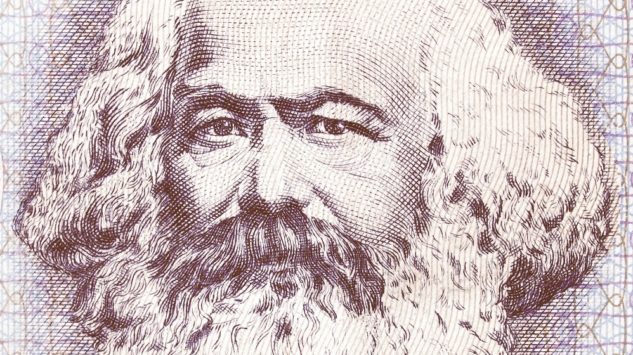Issue Briefs

The appalling seductiveness of Karl Marx
Martin Hutchinson
May 21, 2018
The 200th birthday of Karl Marx on May 5 passed with several indications, in both Europe and China that his appeal is not dead. Indeed, it is showing considerable signs of revival. China has significantly reversed its move away from Marxism, whereas elements in the EU High Command seem to be recognizing that something like a centralized “Marxist dictatorship” is what they are aiming for. “Big Data” possibilities bring forth the frightening chance that Marxism may actually work – better than it did, at any rate, when it comes to centralized resources management. If this is so, how can a freedom-lover fight this apparently inexorable trend?
After communism, the triumph of Western leftist ideologies
Probably the worst prophesy ever made was Francis Fukuyama’s 1992 “The End of History.” Far from becoming universal, the liberal democracy that appeared to have triumphed with the fall of communism rapidly became “liberal” in the American sense, acquiring a thick gooey patina of political correctness, wasteful social spending, non-market interest rates and endless yawning budget deficits. Whatever was supposed to have won in 1991, it wasn’t this blend of statism and soft socialism. As a result of the renewed standing of leftist ideologies, old falsehoods, which were never really killed, only scotched, made a rapid comeback in the West’s education institutions and now appear to be making a significant comeback in the West as a whole.
Rehabilitating Marx?
In this respect, European Commission President Jean-Claude Juncker’s speech in Trier, Marx’s birthplace, was illustrative of this dangerous trend. Saying that Marx had been misunderstood, Juncker claimed that people learned “freedom, emancipation and independence” from his works.
Well, that’s not just rehabilitation, it’s hagiography. And this praise goes hand in hand with the 18-foot statue of Marx, donated by China, that now disfigures the pretty former capital, whose Archbishop was for over 500 years one of seven electors of the Holy Roman Empire.
European Union: impulse to control
The European Union, with its dirigiste assumptions that the big decisions must always be taken by a centralized government, is moving increasingly towards some new rendition of Marxism; while on the other side of the world China never really left it. President Xi Jinping is now promoting Marx as a rallying symbol for the nation, while economically the move towards private enterprise seen since Deng Xiaoping took over in 1978 has reversed in recent years, with state owned enterprises taking the great majority of loans and investments, funded by a banking system that remains almost entirely state-controlled.
The appeal of Marxism
There are three main reasons why Marxism remains attractive: the desire of governments to exert more control, the insidious philosophical influence of leftist professors in universities, and the advent of Big Data, which has for the first time awakened the horrid dream that its practitioners might actually be able to achieve the universal control they seek.
It is no coincidence that the two economists most favored by the big governments of today’s world are Karl Marx and John Maynard Keynes. Both thought in terms, not of an economy of small producers and consumers competing for resources, but of governments allocating them –wisely, of course. In Marx’s case, the individual consumer or producer was subsumed in a “class,” with private ownership had been eliminated and resources allocated by the state, after negotiations between the classes, or –more dramatically—after a cleansing social revolution (with plenty of bloodshed) led by the dispossessed and exploited proletariat.
In Keynes’ vision, while the price mechanism had some relevance in ordinary commerce, interest rates had no place in allocating capital, and the overall level of the economy, as well as much capital investment, would be determined by benign government bureaucrats.
Both systems, therefore, are instinctively appealing to those who choose to work for government and fear the uncertainties and risks of commerce. Keynes was himself highly sympathetic to Marxism/Communism, especially during the 1930s when he was locked out of influence in Britain by the capable free-market Chancellor of the Exchequer Neville Chamberlain.
Governments like to control everything
There is no avoiding the natural proclivities of those working in government, except setting clear constitutional rules preventing them from messing up the economic system. In that context, it is a great pity that Thomas Jefferson, when drafting the Declaration of Independence, allowed his fascination with dodgy French philosophers to replace John Locke’s “life, liberty and property” with “life, liberty and the pursuit of happiness.” Without Locke’s firm affirmation of property rights, there is no protection against government allocating private resources to itself, (a fact reinforced by the infamous 2005 “Kelo vs New London” Supreme Court decision), and therefore no protection against the horrors of Marxist economics. “The pursuit of happiness” as an aspiration tends to negate property rights and provides no real protection against anything.
Intellectuals believe they know how to manage society
The cultural drift towards Marxism needs little explanation. University professors, being unconcerned with the market system and, once tenured and established secure in their jobs for life, are free to advocate economically destructive nostrums.
Most college systems are set up with no effective control on this, because college alumni, many of whom are committed to market mechanisms, are deliberately given very little voice. The institution’s funding is either by government or through a charitable trust that benefits from unfair tax breaks and is thereby insulated from market forces. In such circumstances, there is no check on leftist fantasy, and the idiocies which the older members of the professoriat picked up during the “Summer of Love” are sadly perpetuated among their juniors.
The pull towards Marxism exerted by modern technology is a more interesting question. I speak now not of the likes of “Facebook” which with its PC content-censors is merely another arm of the leftist academic-charitable complex.
Big Data capabilities could be seen as an enabler
Compared to this, the enabling qualities of Big Data are much more sinister. Suddenly the problem that wrecked Gosplan –the lack of knowledge of the myriad factors affecting production, demand and value– may in principle be soluble. To the likes of Juncker and Xi, a dream beckons: If data can only be made BIG enough, it may finally be able to reflect the efficiencies of the market mechanism, while being controlled entirely by Big Brother standing at the Off switch.
If you combine control over Big Data (the ability to monitor the behavior of an entire society) with the censorship possibilities of social media, an even more enticing vision opens to authoritarians in government.
Indeed, using Big Data, modern governments can control the economy more efficiently than Gosplan (or so they think, anyway) and ensure that all the major and little regulations they can think of for enforcing economic conformity are in fact being followed. Then, using social media, they can suppress any data points that suggest something might be going wrong, and ensure that any economic actors whose lives are wrecked by their Big Data economic control are never heard from.
Luckily, it may not work
There are fortunately flaws in the Marxists’ dream of a super-Gosplan. Sure, you can imagine Big Data recording the production side of the economy so accurately that Big Brother has an idea of widget output to the last widget. You can even imagine Big Data recording via point-of-sale terminals every time a widget is sold, so that Big Brother knows the exact sales of widgets, second by second, together with data on where they are sold and who bought them. But there is very little he can do with this data. He can match production to sales, increasing production of fast-selling items – but any filthy capitalist can do this, and with Big Data he will have as much information as Big Brother has to do exactly the same.
What Big Brother cannot do, even with Big Data, is get an accurate estimate of what consumer demand for any new product variant might be, (because opinion polling is unamenable to Big Data accuracy).
Markets still decide
Further, Big Brother cannot in any way change the products the consumer wants to buy, or alter the products sold in any way that optimizes the economy beyond what is done by the market. Any attempt to produce excessive amounts of steel, because you have just decided to call yourself a New Stalin, will result in miserable failure, as consumers will not buy any more steel products than they would in a free market, so the excess steel will still be wasted.
The instrument of control that Marx never thought of is interest rates. By pushing economies onto fiat money, and then setting interest rates at bureaucrat-determined ultra-low levels, Big Brother has over the last decade produced a gigantic mass of misguided investment, and urban housing markets that completely fail to serve ordinary people. This will doubtless eventually produce another enormous housing crash, which Big Brother will address by inventing more controls (such as abolishing cash) and distorting the economy further. Still, to be fair, it is Keynes, not Marx, whom we must blame for this particular gigantic economic disaster.
Social media may offer Big Brother better opportunities for Marxist control than Big Data. If as several countries of the EU have recently done, you have through legislation acquired control of social media’s output, so that you control the political and social messages seen by the vast majority of the electorate who do not take the trouble to make themselves properly informed, then you have gone a long way to ensuring that the electorate will vote as you want it to vote.
Consensus imposed from above
The EU is happy to sneer at Vladimir Putin’s version of “democracy” which draws heavily on techniques developed in the previous Marxist-Leninist state. But one can easily imagine the EU itself and its puppet European Parliament becoming a very similar one-party bureaucracy, with opposition limited to a few gadflies from unimportant countries, which can easily be quelled and overruled. As Putin has discovered, you don’t need to control 99% of the votes in an assembly to do exactly what you want; 70% will do just fine.
Can capitalism survive?
Fortunately, it appears Big Data won’t be able to bail out Big Brother, although social media may well make his task of domination easier. If a free market can be kept going, the lives of ordinary people will improve even in a non-free state, as Russians have proved over the significantly populace-enriching period of Vladimir Putin’s rule.
The trick, therefore will be to preserve as much of capitalism as possible against the bureaucrats – and do something about the universities, so Marx’s pernicious doctrines are gradually relegated to the dustbin of history, where they belong.
 |
Martin Hutchinson is a GPI Fellow. He was a merchant banker with more than 25 years’ experience before moving into financial journalism. Since October 2000 he has been writing “The Bear’s Lair,” a weekly financial and economic column. He earned his undergraduate degree in mathematics from Trinity College, Cambridge, and an MBA from Harvard Business School.
This article was originally published on the True Blue Will Never Stain http://www.tbwns.com
|